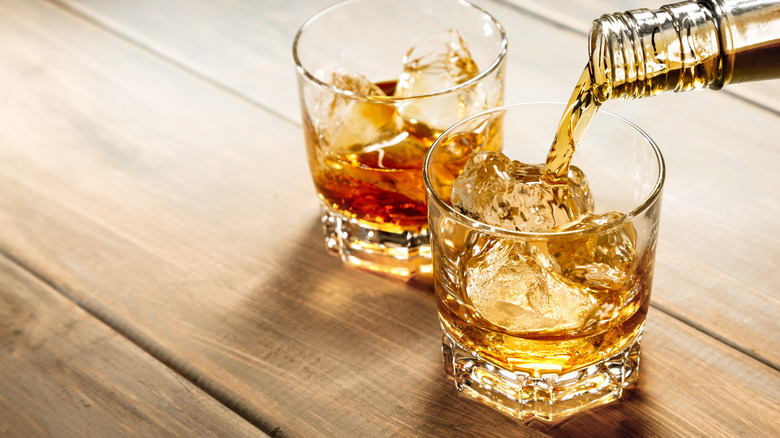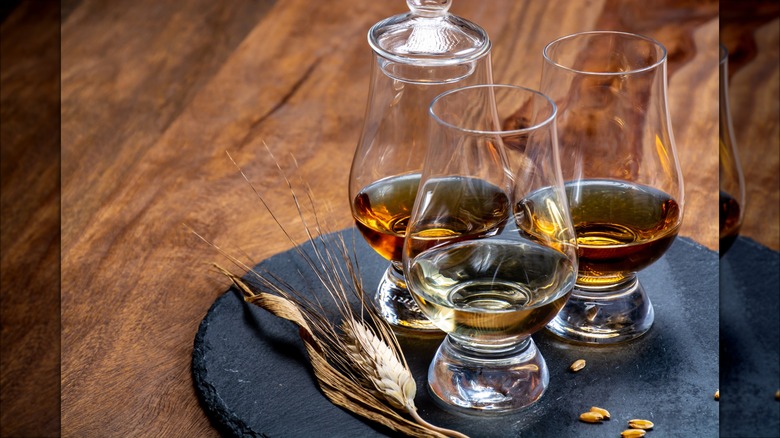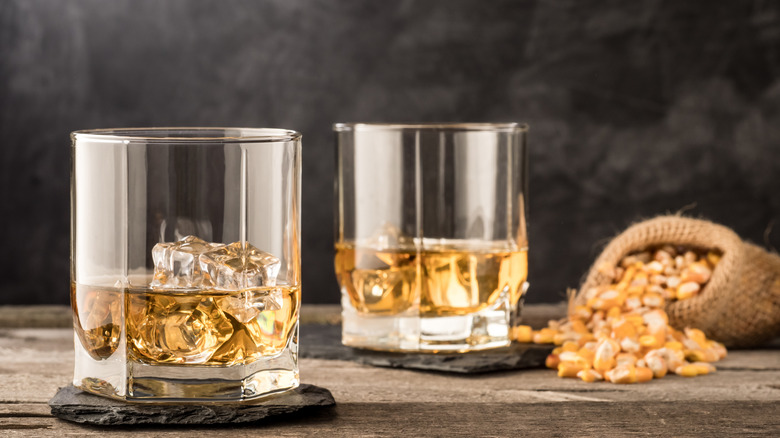Bourbon And Whiskey Are More Different Than You Might Think
A fact to nail down right off the bat when finding the dividing line between these two spirits is that ... all bourbon is whiskey, but not all whiskey is bourbon. To explain — whiskey is a catch-all term for spirits distilled from fermented grain mash; this can include any combination of grains — think corn, rye, barley, and wheat. Bourbon is a subcategory of whiskey with distinctive details.
According to the American Bourbon Association, for whiskey to earn the bourbon label, it must contain at least 51% corn in its grain mix. Additionally, it needs to be: distilled to no more than 160 proof, bottled at 80 proof or higher, aged in newly charred oak barrels, and produced in the United States.
These aren't just meaningless minutiae for only distillers to know; they significantly shape the taste of the spirit. When you're picking a drink for the evening or deciding what to mix into your next cocktail, these differences can guide your choice.
All about whiskey (or is it whisky?)
Whiskey, or whisky, if you're venturing outside the U.S. or Ireland, all vary somewhat in their production methods and preferred grain mixture. Traditional Irish whiskey, for example, has delicate fruity notes thanks to the fact that it includes unmalted barley. Compare that to American rye whiskey made from (surprise, surprise) primarily rye, and you have a very different drink with hints of spices.
But it's not just the grains that make the difference; the environment plays a huge role too. Scotch whisky, for instance, uses peat during the malting process to produce its distinct smoky flavor. Within Scotland, distinct production methods, types of peat, and ingredient proportions can produce unique flavors.
And then there's the distillation process. Irish whiskey is often triple-distilled, making it smoother and lighter. In contrast, many Scotch whiskys are distilled twice, retaining a robust and complex character. These subtle yet significant differences affect not just how each whiskey tastes but also how it's enjoyed. While a smooth Irish whiskey might be perfect on its own, a rich, peaty Scotch can add incredible layers to a cocktail like a Rob Roy.
Bourbon's American legacy
Bourbon, with its mandatory majority corn mash, is characterized by its sweet, rich flavor profile. Sip mindfully and you'll notice notes of vanilla, maple syrup, and caramel. When it comes to bourbon, aging is key. The longer it sits in charred oak barrels, the more flavor it picks up — turning it into a more complex drink.
This iconic spirit is predominantly produced in Kentucky, a region celebrated for its limestone-rich water. Since water is the first ingredient in any whiskey, this makes a difference. The limestone naturally filters the water, removing minerals that can add undesirable flavors and adding others that help with the fermentation process. This results in a smoother bourbon with a distinctive taste, deeply tied to the geographical identity of Kentucky.
Bourbon can certainly be enjoyed neat, but just like other whiskeys, it's versatile and can be used in cocktails too. Mint juleps, whiskey sours, bourbon smashes, and Manhattans are all tasty options. But whether you choose bourbon or go broader with whiskey, both spirits offer a diverse range of flavors and experiences for any occasion.


